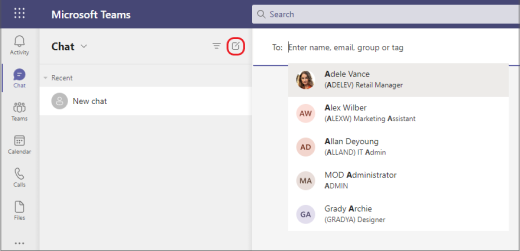On This Page
- Overview
- Chat messages should only be used for transitory messages and not official UW business
- Chat messages that need to be saved
- Timeline for chat message retention policy
- Background
- Why is a retention policy needed?
- Frequently Asked Questions (FAQ)
- Support
Overview
Starting May 1, 2024, UW is implementing a 30-day retention policy for Microsoft Teams chat messages. This policy will automatically delete all chat messages after 30 days.
There are no exceptions to this retention policy.
Chat messages that are subject to this retention policy and will be automatically deleted after 30 days include:
- Microsoft Teams chat messages
- Chat messages posted in Teams meetings
- Copilot for Microsoft 365 (AI) chat messages
Chat message components that are not subject to this retention policy and will not be automatically deleted include:
- Files sent in a chat message, which are uploaded to the OneDrive for Business account of the user that sent the file (e.g., a Word document)
- Posts made in a channel within an instance of a team
Chat messages should only be used for transitory messages and not official UW business
Chat messages should only be used for transitory messages and not official UW business. Transitory records are records that are created or received to pass along information of very temporary value and that are not otherwise subject to a longer retention schedule.
For more guidance on transitory records, refer to Records Management Services and for UW Medicine, refer to Records and Information Governance (RIG).
Chat messages that need to be saved
If a chat message contains substantive records, such as serving as the sole record of certain approval actions, including a hiring action, financial transaction, or a change to a procedure, it must be saved elsewhere and kept according to the respective retention standards.
For more guidance on chat messages that need to be saved and how to save them elsewhere, refer to Records Management Services and for UW Medicine, refer to Records and Information Governance (RIG).
Timeline for chat message retention policy
- Day 0: Chat message chat sent
- Day 0-31: Chat message remains visible, unless it is deleted by the sender
- Day 31-38: Chat message is removed from Teams UI automatically, if not already deleted by the sender
Due to the large number of existing chat messages, it may take until October 2024 before the chat message retention policy applies consistently to all chat messages.
Background
UW users currently send over five million chat messages per month. Currently, chat messages are only deleted when the sender intentionally deletes a chat message or once all chat participants have had their services removed according to UW Office 365 Account & Data Deletion timelines.
Most chat messages are intended to be short-lived, but there is no practical way for users to delete chat messages in bulk.
Why is a retention policy needed?
Student, Employee, Patient, and Research Subject Privacy: A 30-day retention policy helps safeguard student, employee, patient, and research subject privacy by limiting how long chat messages that may contain sensitive information such as personally identifiable information (PII) exist. Automatic deletion of chat messages reduces the risk of unauthorized access or misuse of personal information. Although highly secure, chat messaging is not designed to address long-term access or data management issues needed for sensitive information or records retention.
Efficient Resource Management: The UW has over 160,000 accounts in its Teams environment. This includes students, faculty, staff, contractors, and other affiliates. With over five million chat messages generated monthly, managing storage resources efficiently becomes crucial. A 30-day retention policy helps optimize storage capacity, reduces associated storage costs, and helps avoid users running out of mailbox space to store eDiscovery copies of chat messages.
User Performance: Limiting chat message retention to 30 days reduces Teams client performance issues caused by long chat message histories that need to be retrieved by clients and cached locally.
Records Management: By setting a 30-day retention policy for chat messages, it makes it clear to users that chat messaging is only designed to be used for Brainstorming and Collaborating, Extracted Data, Informal Notifications and Communications, Logs, Organizing/Monitoring Work in Progress, Published Reference Materials, Requests for Information, and other transitory information that may be disposed of without a specific retention period according to UW Records Management Services guidance on transitory materials.
Streamlined Search and Discovery: Limiting chat message retention to 30 days makes it easier to locate and access relevant information when needed. It reduces the volume of data that needs to be searched, facilitating faster and more targeted discovery during legal or internal investigations.
Frequently Asked Questions (FAQ)
No.
No.
No. Files that get shared via MS Teams chat messages will not be deleted just because the chat message was deleted. Files shared in chat messages are simply links to where the file is actually stored, for example, in SharePoint.
No.
eDiscovery copies of chat messages are removed from the Exchange mailbox of each chat participant between 32-68 days after a chat message is sent. Under some circumstances, eDiscovery copies of chat messages may be held in an Exchange mailbox or OneDrive for Business account for indefinite periods of time due to legal, compliance, or administrative reasons. eDiscovery copies of chat messages cannot be accessed by users and cannot be used to recover chat messages to the original message format.
Microsoft has not released a way to export chat messages from the enterprise version of the Teams service, unlike the consumer version of Teams.
Support
If you need further assistance, please contact UW-IT at help@uw.edu or 206-221-5000.


